Peter Lougheed Provincial Park to Field

July 17, 2004
Despite my anticipation of getting back into the mountains today, I did not sleep well. The ground was hard and I had to wear my earplugs for most of the night because the tourons around me decided, quite naturally, to stay up late into the night. I was determined to stay in bed for as long as I could, but finally had to get up around 7:15. I downed some tea and donuts before hitting the trail under immaculate skies and perfect weather: Cool, not cold. Reflections of what I had read in The Four Noble Truths dominated my morning walking, which says a lot considering the land I was passing through.
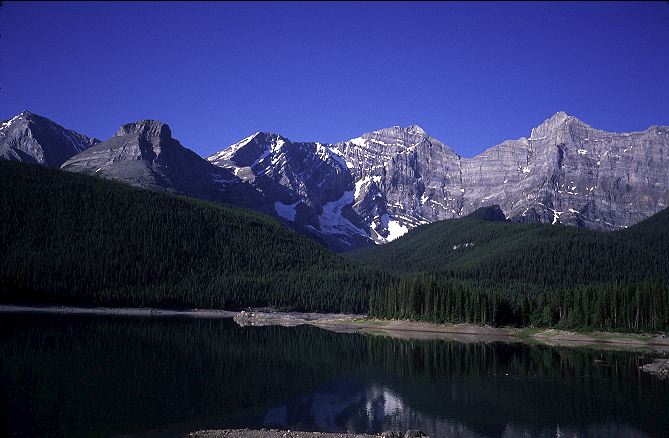
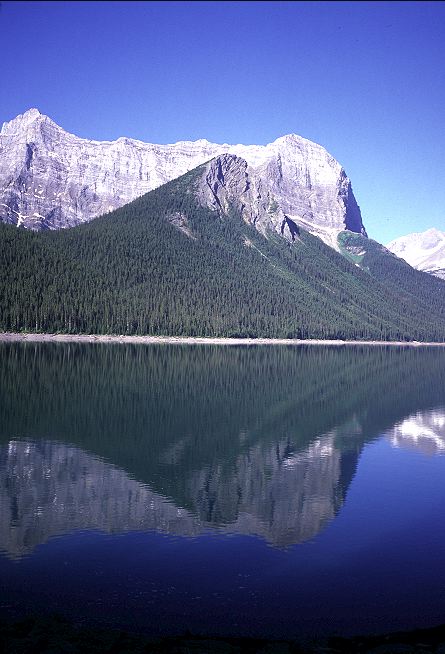
The campground was downhill from Upper Kananaskis Lake, which might be the most spectacular alpine lake I've ever come across. Better even than Upper Elk. Unfortunately, in a few hours it would be mobbed with tourons and most of its charm swept away. Even at 8:20 there were a few people out, including what looked like a photo shoot for some rock star. The trail led along the lake shore, following a rocky traverse line, giving me occasional glimpses toward the mountains I was trying to gain. Dumping me out into forest near a dam separating Upper and Lower Kananaskis lakes, I came to a perfect stream and sat to take a break, the first of the morning, even though I had not been hiking for very long.
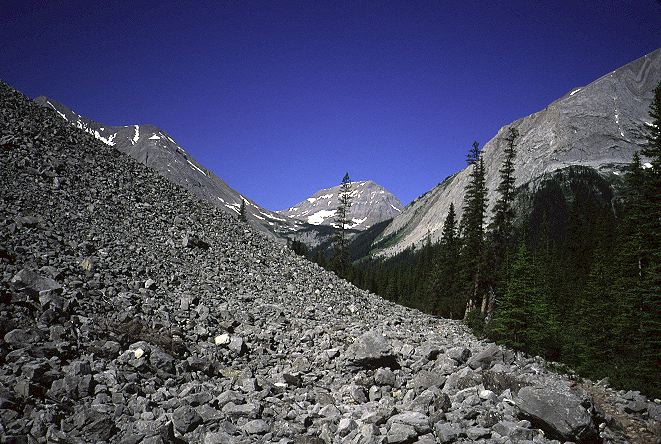
Cause and Effect. Causality. The idea that everything is caused by something. Everything is the cause of something else. Buddhists seemed to take this basic idea to its extreme logical conclusion and asked the Big Question: Is there anything which does not have a cause. Is there anything which has independent existence? Is an effect merely the sum of its causes? Is a whole more than, less than, or equal to the sum of its parts. A perfect stream rippled by. One of its causes was melting snow. Another gravity. Was the stream more than the sum of gravity, snow, and temperature? I thought deeply, looking for an example of something that had no cause, something autonomous, independent. A group of people hiked down from the mountains while I was sitting by the perfect stream contemplating Cause and Effect, although I barely noticed.
My body was moving, but my mind was back at the stream, back with Cause and Effect. We take for granted that the physical world, the world of the senses, is dominated by Cause and Effect. Things simply do not happen without a reason. Even if we do not understand why something happened, we understand that something caused it. A good person can be struck down by a sudden illness and die. We might not understand why they died, but we understand that the illness caused the death. The illness in turn was caused by something else, perhaps an infection. The infection in turn was caused by yet another factor. And so on, ad infinitum.
However, HH The Dalai Lama carried the argument further. Things beyond the sensory world, such as thought, creativity, and self are also constrained by the law of Cause and Effect. A person is not an independent entity. Not only is the physical body subject to Cause and Effect, but so are the mind, soul, spirit. This was somewhat troubling and so I searched for examples of truly independent events. My meditations were interrupted by the sweat falling heavily off of my brow and my labored breathing. I had barely noticed that I had left the forest of trees for the open slopes above Turbine Canyon. My body needed my minds strength, and so Buddhism would have to wait for another opportunity later in the day or tomorrow morning.
I plowed up the canyon wall, passing some day hikers. I rested at a high mountain stream to check my maps and get some more food to eat out of my pack. Mosquitoes swarmed me, driving me away from my resting place sooner than I liked. Necessity causes action, it seems. Hiking once again, I burst over a crest and looked down upon the stunning basin holding Lawson lake. The mountains rimming the basin held numerous glaciers and tempted one to stay and climb and explore. Alas, such was not for me, at least today. I had only so much food with me and could not stop after only hiking for a few hours.
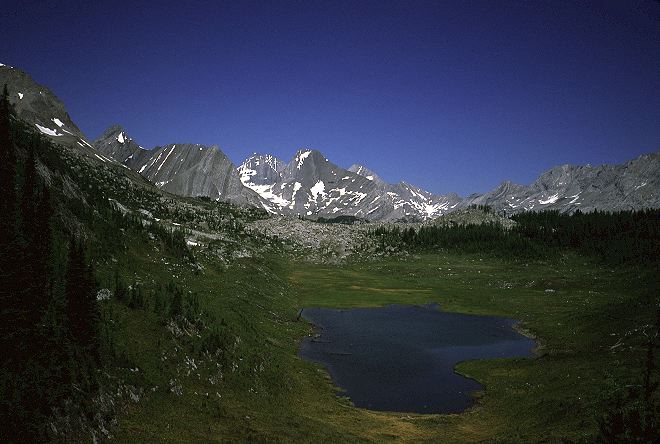
The trail dropped to the lake shore and then ran along side its banks for a bit before regaining the trees on the other end. A campground was located here, inconveniently far from the lake, although with grand views of the surrounding mountains. A day hiker was resting here, having gotten an early start from Mount Sarrail. I was somewhat shocked that actual hikers spent time there. We spoke for a few minutes about the area and my hike and the Rockies in general, but nothing of substance. I bid her luck on the walk down and started the final push up to North Kananaskis pass, right on the continental divide. From there I would leave the civilized nature of Peter Lougheed and enter into the wilds of Heights of the Rockies Provincial Park, where trail standards were supposed to be much lower, but where few hikers went and were there were no restrictions on camping. It was also the last run to Banff and a return to the National Parks of Canada.
The trail wound up through the forest, climbing moderately, and led to microscopic, milk-blue colored Maude Lake, perhaps ten vertical meters from the pass. The wind was howling as I passed the sign telling me I was leaving Alberta. An old and battered sign held something that looked like Heights of the Rockies. The trail faded instantly, but could still be followed with a little caution. I crossed the pass and dropped down to where some large rocks and a few trees were huddled about and took a break in the wind protection they provided. The guidebook and the maps told me that I was going to lose a lot of elevation shortly and have to deal with trails maintained only by the local elk population. Still route finding should not be a problem, as I had to go downhill and meet up with LeRoy Creek and then ford Palliser River. The main problem was that the Palliser might be a difficult ford, as indicated in the guide. Secondly, the thought that two GDT hikers were turned back in this area was not comforting. I was not going back to roadwalking.
The pass led tunnel-like down steeply before finally opening up and throwing a spectacular set of mountains in front of me. Spectacular enough that I had to stop and look at my map to see what they were. Each was named after a British monarch, and collectively they were known as the Royal Group. Stunning and brutal, I had no illusions about trying to climb and explore them. That was a task for someone with skill and ability, not a plodding hiker. Satisfied, and wondering why they had not been swallowed up by Banff, I shouldered my pack and began the very, very steep descent down toward LeRoy creek.
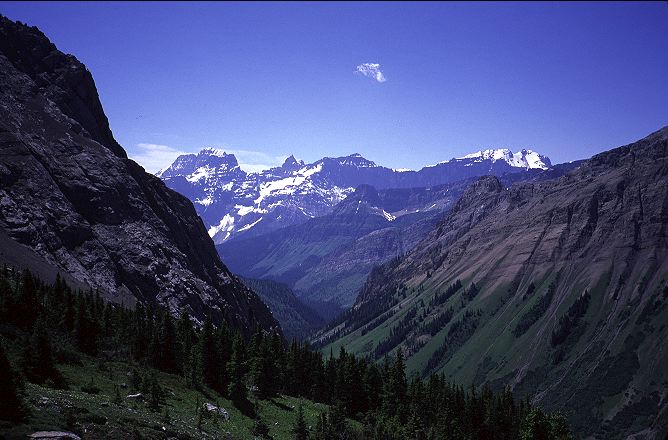
I soon ran into a backpacker, a rarity, who had come over South Kananaskis pass and was heading for the north pass, which I had come through, midway through with a good loop. No trail down there, he said. I began to feel a sense of dread, although not because of the growing feeling of aloneness or the unknown difficulties ahead. I was not worried about myself, but I had a sense of trepidation concerning my mother back home in Evanston. I do not know why, but I felt that I should have called her from Boulton Creek, that something was amiss back in Illinois. It might simply have been my fears for getting through the brush below me and across the Palliser, but I could not shake the feeling that she was somehow in trouble. I was now almost a week from the closest phone and so would have to deal with this as best I could before then. Shutting such things out does not work; they always find a crack in ones armor to slide through. No, it was best simply to let the dread be, and not to fight against it. A willow survives the tornado that knocks down the oak.
The trail was non-existent in places or thickly overgrown, although the steepness had let off. I was generally able to move in the right direction and would occasionally find myself crossing or rejoining good trail. The roar of water wafted up to me and five minutes later I was on the rocky banks of LeRoy Creek. While fast, it was not wide and where I had come out of the woods there was an excellent ford. Leaving my shoes on (only the stupid or foolish go across cold and fast mountain streams in their bare feet), I moved slowly, but confidently, across the frigid water and reached the other bank having only gotten wet up to my upper calf. On the other side were a few cairns marking the way, and I was surprised to find reasonable trail. Occasionally it would fade out, but following the right direction was generally easy. The backpacker must not have crossed the LeRoy.
The good trail dropped me down toward the Palliser, with views of LeRoy creek picking up steam and crashing down through an ever tightening canyon. The roar of the Palliser eventually began to overpower that of LeRoy and my dread began to take on a more personal note. My pace quickened as I pushed to finally resolve the mystery of the Palliser. Would I be turned back now? I really didn't want to go back up hill, and even less to have to roadwalk. Neither did I want to die. I pushed through a final set of trees to looked upon the Palliser, and gave a mighty laugh at the pitiful spectacle. Right where the trail came out the Palliser braided into two slow moving channels. I jumped in and walked across through the surprisingly warm water and found a few bushes by the far bank where I could rest in the shade with my feet in the water. It was only 3:30 and I had only 7 K to go to make Palliser Pass and the entrance to Banff National Park and the end of bad trail. I could be in camp by 5 at a reasonable pace. Unencumbered by time, I flopped over and took a good rest, feet dangling in the Palliser and sheltered from the sun by the river brush. Dread and trepidation melted away in the peaceful calm of the mild river that I had been so afraid of.
At 3:30 I began to drag myself up the Palliser valley, heading toward Palliser pass and Banff National Park. I intersected the trail and headed to the right, north and up valley. Very quickly, the trail curved back to the south and started running down the valley. Sure that something was wrong, I retraced my steps and found a small trail heading north up the valley, complete with a few horse droppings to mark the way. I cross the river again and shortly thereafter lost the trail. I back up, found the true path and pushed on. Repeat. Repeat. Repeat. Occasionally, I would decided not to retreat and simply forge my way through the bush. This was never a good idea. The bush was thick and blood soon flowed from my arms, oozing out of deep scratches. I knew that I had to head up hill and so pushed far up on the eastern slopes of the valley hoping to outclimb the vegetation. No luck. I was quickly getting battered and sweat flowed freely from my tired body. An hour passed. A second. Tenuous footing and the bush made my forward progress almost nonexistent. My foot became lodged in a snarl of brush and I pitched forward, hitting my knee on a rock. The same knee that I had hurt on LaCoulotte ridge a week ago. I howled in pain and cursed the Palliser. I knew that I was nowhere near the correct trail, but was occasionally able to pick up game trails to ease my progress. However, they never lasted for long and finally, after pushing my way through a particularly bad stretch of pines, I burst out onto a rock and collapsed. I drank the rest of my water, but was still parched. It was nearing 7 and I wasn't any closer to the pass, it felt, than before. Every square inch of my clothing was soaked from the exertion to get here, and I wasn't even sure where here was. I hadn't crossed any of the streams that the map showed as coming down from the eastern wall of the valley. I couldn't see much of the headwaters, although I could spot the Palliser itself.
I couldn't camp anywhere around here, because of a lack of water and space, but also because I didn't want to camp until I had an idea of where I was. I forged on, hoping for the best. An hour passed and I finally reached a stream where I could replenish my water supply. New red welts were on my arms and neck and my pack and shirt and pants were covered in pine resin and needles. I fought through more trees and was finally halted, not by more brush but by a cliff. I was nearing the head of the valley and now had a choice. Ahead of me was a fork in the valley, quite literally, with one canyon heading off and up to the right, and another forking off to the left. Both were going where I wanted to go, but only one was the right choice. Water flowed through both and the cliff I was standing on was above the right fork. I looked at my maps and compass and could not make out a fork on the large scale topographic map. Things were just too big and my map skills just not good enough. The compass didn't help much. I rested and debated and finally decided that I should stick as far left as possible, even, though that meant backtracking a bit to find a way to downclimb the cliff, traverse across the water and rubble near the fork, and then climb, hopefully, on another game trail. I had given up all hope of finding an actual trail.
Carefully, I worked my way down the cliff of a sequence of tight and steep game trails and ledges and reached the bottom, only to have to ford the creek coming down from the right fork. Back onto boulders and rock and a stiff climb got me into the left fork and, quite to my surprise, a big, superhighway (at least in comparison) trail. The trail that, no doubt, I had idiotically left back near the Palliser when it turned south. Cursing my stupidity, I plowed up the trail, uncaring that my body was tired, bleeding, and worn out from more than four hours of bushwhacking. I powered up hill and gained sight of the lakes, just south of Palliser pass, where I had planned to camp. No more, I thought, during a break in the sun. I was going all the way to Banff and be done with the bad trails and bushwhacking. I dropped down to the lakes, moved around them, fording outlets, occasionally, and pushed myself uphill, past several reasonable campsites to finally gain a broad pass, in the center of which held a sign welcoming me to Banff National Park, and reminding me that it was illegal for me to camp there (no permit).
I could hear the roar of water not far off to my left. Paralleling the invisible boundary between wild and civilized, I made my up remnant snow to find a big flowing stream, with lots of mosquitoes. Dinner time never came so soon. I gulped down two packages of ramen noodles, after putting on lots of DEET, barely taking time to chew. My dinner done, I loaded up on water and walked back to the Banff sign. Nowhere reasonable to camp, except on the Banff side, and so I walked over a few small hills, still in the BC side of the Divide, and found a flat-ish spot in which to throw up my tarp and hide from the bugs. Food hung, camp set, bugs killed. I was tired and had blood and scratches on my neck and arms. My knee ached. I had torn a two inch gap in one of my shoes. I had resin covering most of my clothing. I did not want to hike any more, at least for today. Tomorrow was another day, although I didn't have much in the way of choices if I didn't feel like hiking then. What should have been a casual walk up the valley of the Palliser had turned into a brutal, crushing march, thanks to nothing other than my foolishness at having left good trail for bad. I thought I had learned this lesson on the AT earlier in the summer, but now it was solidified in my mind. Never would I get off good trail to take bad trail, unless there was a clear, compelling, and obvious reason to do so. Snug in my bag, I didn't bother with HH The Dalai Lama. I was not in the right mind to absorb anything, and my body was too tired and broken to let my mind relax. All I could do was sleep and hope for a better tomorrow.
I've always been amazed at how much a body can heal given just one night's rest. I slept deeply and peacefully during the cold night, thanks to the quiet of the pass and the soft ground I was on. It took some effort, but I finally coaxed enough motivation from my mind to retrieve my food bag and make some tea. Flocks of mosquitoes were waiting for me outside the tarp, seemingly oblivious to the cold of the morning. I started water boiling for tea and spread out my maps out in front of me, back in the safety of the tarp and its bug netting. I had no real objective for the day, as I was two days ahead of the permit that I had bought back in Calgary. I wanted to go over Wonder Pass into Assiniboine Provincial Park, but was unsure if I wanted to put forth the effort to actually do that. Marvel Lake, still in Banff, would make for a short day (a mere 32 kilometers) with minimal climbing. It might also be crowded with people and I could run into a warden who would write me a ticket for camping without a permit. After all, I reasoned, Parks Canada wouldn't make it so difficult for people to get into the backcountry if they were not going to enforce their policies. I left the decision for later in the day. For now, I had to get down from Palliser Pass and into the flood plain of the Spray river, along with dodging the mosquitoes while I broke camp.
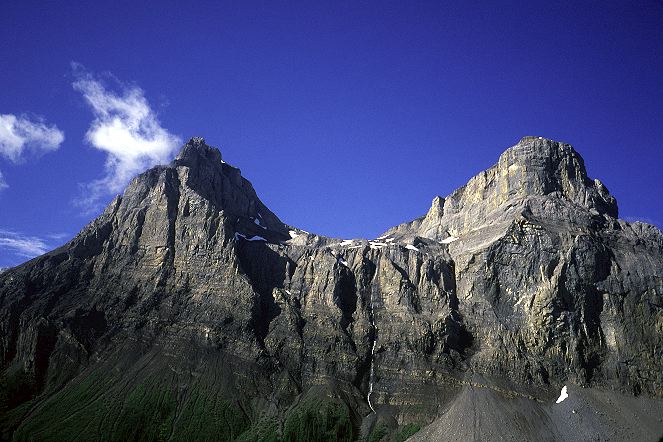
While still cold out, the sky was clear and happy and the hiking easy. Large mountains vaulted up around me as I dropped down from the wide, broad pass. Most unexpectedly, the trail faded. Surely, not in the premier Canadian park that charged so much! I picked up the trail again, only to have it run out again. Fooled twice now, I dropped any pretense at trying to follow the sometimes invisible trail and instead just rumbled down the slopes, which were open enough to make cross country hiking easy. Occasionally I would pick up the trail in mid-switchback and follow it for a bit. In this way, I reached the flood plain and was delighted by the scale of the land around me. The flood plain stretched far out to the north, only slightly down hill, with the aforementioned mountains rimming it. The Spray was braided, with channels spreading out and contracting in small distances. Still, not much of a trail. But, I could see where I was going and simply struck out along the flood plain in the general direction of north.
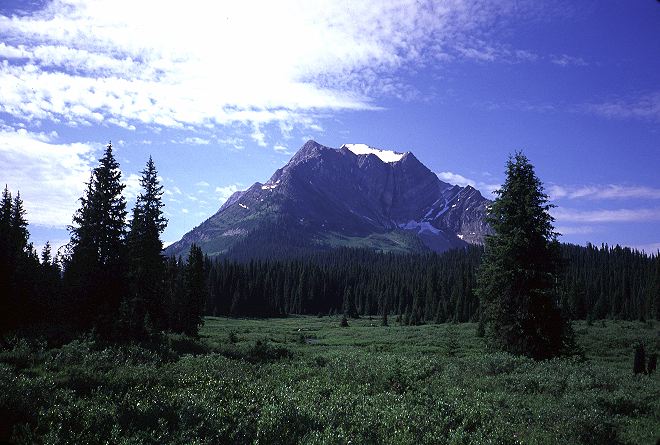
I had to slosh through marshes and occasionally ford the chilly Spray in order to keep my motion going forward. The trail, or parts of it, were most likely in the woods to the right, but I was happy where I was, despite wet feet. This was exactly the type of hiking that I loved: Open, impressive mountains, easy, and with good views in all directions. As I made my way down the river valley, I was eventually forced toward the right rim of the valley by particularly large and deep looking channels and a sequence of shoe-pulling mud pits. I was rewarded by the trail, which ran along in a meandering course, heading down hill and for the mountains in the distance. It even had the occasional bridge over creeks small enough to jump over. It seemed that Parks Canada liked creating solutions to problems that did not exist, but left alone problems that did. Surely they would get better at things as I neared the heart of the park.
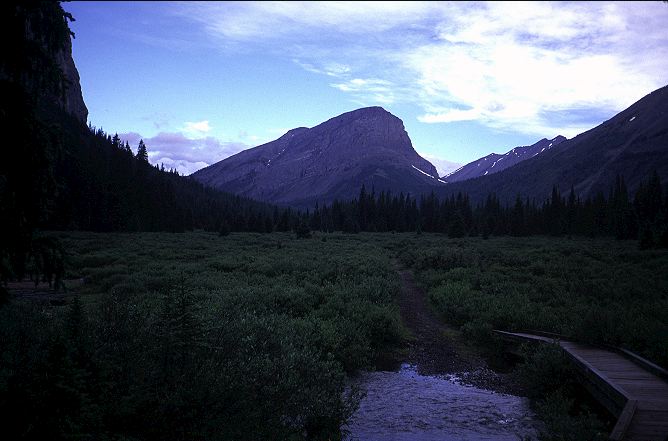
I lost the trail in the woods and simply struck out cross country through the semi-open expanses of pine forest in the valley; it seemed easier, especially after yesterday, that trying to follow the trail. I burst stepped through the woods and met the trail, down which was coming a backpacker, one of the very few I had seen since leaving the States. He and his two friends had hiked up the valley yesterday and were going back down today, their trip complete. They just couldn't get anymore time from Parks Canada on their permits. I wanted to laugh, but I didn't think the backpacker would like it. It wasn't him, though, that was funny. It was the park system that the Canadians put in place. In the name of maintaining trails, that seemed not to be well maintained, they kept people out. I sat to take a break and the backpacker pushed on, annoyed with having to wait for his friends.
I sat under the now warm sun and contemplated my options for the night. I could stay at Marvel Lake campground, in Banff, and then go over Wonder Pass in the morning. Or, I could stop being so lazy and get over Wonder Pass today and camp in Assiniboine at Lake Magog camp, which would cost me $5, but be legal. Or, even better, I could push all the way to Og Lake, pay $5, and be legal. Og Lake would have the fewest people (furthest from the Assiniboine Lodge), but would require the most effort. Marvel Lake would be the most crowded (only a few kilometers from a road), but require the least effort. Decision deferred.
After lounging for twenty minutes, I continued down the trail, following it into a thicket as it began to run the wrong way, heading up to the right of the valley. I found the backpacker at a stream in a meadow, scratching his head. He said that the trail faded out completely in a few more meters and he didn't know what to do. I continued on the trail to see what was to be seen, and concluded that he was indeed correct. Not only did the trail fade out, but it had been going the wrong way when it did. I returned to the stream and told the backpacker that I was just going to follow the Spray again, rather than bother with Parks Canada's attempt at a trail. A few meters back I spotted what looked like a game trail heading in the right direction and followed that, only to have it widen into the actual trail. Brilliant bit of trailwork, I thought. I wouldn't mind poor trail conditions so much if there were fewer restrictions. Parks Canada had gotten a bunch of money out me (and every other trail user) and forced me to jump through some official hoops to get here. I wanted something for the effort. If it didn't cost much, or there were no restrictions (like having to get a permit in advance and camp in official places), it would be fine if trails were not always maintained. But, such was not the case.
I walked for an hour down the valley, with the trail improving as it neared an empty warden cabin, and even stayed in good shape for the last bit of loping down the valley. Every minor stream was bridged, and some large ones too. Old axe blazes appeared in trees and junctions became signed again. I must be nearing the front country, I thought, to have such luxuries. I stopped near a lazy creek and lounged on the bridge over it, content to go nowhere fast. The scenery would be distant until I neared Assiniboine and I was liking the weather. The bugs were gone and I couldn't see anyone around. My decision seemed set: If I was going to be lazy today, there was no reason to try to hike all the way over Wonder Pass. It was better to have a short day.
I hiked the rest of the way down to the Watridge trailhead and picked up my new trail, leaving the Spray for Bryant Creek. There was a warden cabin nearby and I wanted to see if anyone was about, deliberately tempting the wardens to ask for my permit. Mostly, I wanted a quite place to eat some lunch and wash my clothes. I detoured along a spur trail to the warden cabin, passing some nervous horses, and peered inside. A warden was eating his lunch in the cabin, which seemed rather odd given how nice the day was and how few bugs were out. Not spying me, I walked over to the banks of the river and got out of sight, behind some trees. I stripped off my clothes and rinsed the salt and some of the dirt out of them in Bryant Creek and hung them up on bushes to dry. Massive peanut butter and Nutella burritos formed my lunch, along with some cheese and crackers. Even though the warden was near, I thought it unlikely that he might come outside his abode. Even though I was close to one of the busiest trails in the park, I thought it unlikely that anyone would come down and invade my own little spa by the banks of the river. After the effort of yesterday, this was exactly what I needed: A day short enough that I could afford to take long breaks every hour. Short enough to sit in the sun and do nothing for long stretches, and still get into camp early.
I arrived at Marvel Lake campground a few hours, and several breaks, later, having made the almost flat (to me) walk up. The campground was a dump. The sites were lumpy, hard, and depressed. They were almost completely non-optimal, and I couldn't believe I was actually going to camp in such a place. If it rained, the sites would fill up with water, for one thing. For another, despite being called the Marvel Lake campground, it was no where near the lake. I pondered the wisdom of my decision to have a lazy day if I had to stay in such a place. I would sooner walk another kilometer to the nearest warden cabin and stay on their front porch. But, I was here and so I would stay and hope that it would not rain hard. I chose the least depressed campsite, and furthest from the other occupants of the campground. Roots and a good slope greeted me, but there at least I would stay mostly dry in a rain. Three backpackers rolled in to camp, and I recognized them from the hike up. I had passed them during one of their breaks on the walk from my spa to the campground. From Montreal, they were a little confused about where to stay. They had a permit for the night, but didn't know if there were assigned sites or not. I confessed that I had no permit, but didn't think there was assigned seating, as if we were still in the second grade. Two of them left to pitch their tents while the other talked with me about my tarp. Eventually the endpoints of my hike came out, which the Quebecois thought grand. He and his friends were on a 10 day vacation and they had planned a long hike through Banff, following roughly my route, but at half the pace. Unfortunately, Parks Canada would not issue them a permit and so they had to break their trip into two parts, with a long hitch in between in order to get back to their rental car. At this point Parks Canada was not making any friends, it seemed, anywhere.
I retired to the cooking area to make my dinner. Tonight would be my first night cooking with the solid fuel tabs, my canister having run out just as my morning tea came to a boil. I collected some rocks to use as a pot stand, filled my pot with half a liter of water, and set it over the stinking flame of the tablet. Three older women came into the cooking area and started making dinner, very pleased that they were almost done with their hike. They had come from Sunshine Meadows, in the north, and were hiking the same route I would be (in reverse), all the way down to the trailhead near Watridge lake. The loved the area and assured me that I would find it to be amongst the best in the world. Their enthusiasm was clearly high, and I tried to be complimentary. Tough hiking, they thought. I thanked them for the warning, not wanting to tell them that I would cover the same terrain in about a day that took them four days. And, I would probably consider it an easy day. They moved off to start their dinner and I check on my water. I was laughing as the Quebecois appeared: My water was about as warm as if it had come out of a tap in a house with a bad water heater. I piled three tabs in between the rocks and started again, chatting with the French Canadians. Hawk Creek trail, a critical connector for me, was apparently closed. Parks Canada had declined to recut the trail after it burned last summer in a forest fire. Most unfortunately, for me, this meant that my access to the Rockwall Trail in Kootenay was cut off. I'd have to find some alternate way around. More disturbing was the idea that all of the trailheads in the Kootenay area might be closed for the same reason. If so, there was going to be a lot of road walking in my near future.
Sitting under my tarp I opened up HH The Dalai Lama again, partially because I was feeling ill at my thoughts as the women backpackers were talking to me and wanted a lesson. Outwardly I was being friendly and kind and cheerful. Inwardly, I was been arrogant, insulting, and petty. This I knew to be wrong, but it was always somehow so difficult to make the two agree. To be genuine, it seemed was a central ethical point in Buddhism. To be transparent, rather than deceitful. I turned a few pages, but realized that reading the words was pointless. I already knew that I had been in the wrong, and knew why. Reading more words about it would not help me. I simply had to change, to become more genuine, to become more compassionate and supportive. Not simply to express in words a kind thought, but to truly have that kindness in my heart. Tucking into my sleeping bag, I hoped, as the night before, for a better tomorrow. Not only for good trail, but that I might be a better person.
Soft rain fell overnight and the silnylon tarp sagged enough to make getting out of my sleeping bag challenging. I jogged over to the food hang area and retrieved my soaking wet food bags during a break in the rain and noticed that the ladies from Sunshine meadows were already up and about. For once, I was going to be beaten out of camp. I decided not to make tea, as the fuel tabs really didn't work very well and I was unsure that I would have enough to cook my dinners, let alone tea. I struck camp quickly, packing up the wet tarp, stuffing it into the outside pocket of my pack, and set off down the trail, heading for Assiniboine Pass rather than Wonder Pass. While it had stopped raining, the sky was heavy with dark grey clouds and it seemed foolish to work hard for a scenic pass in such weather. I caught the women at the trail junction, where they turned right for the trailhead and I turned left for the pass. The trail ran along pleasantly, with little elevation gain, all the way to near the pass. Along the way, I passed by a very nice looking cabin shelter, by advance reservation and extra fee only, which sat next to a warden cabin. Both appeared to be completely empty. Allenby Junction campground came and went, and might actually be a worse place to stay than Marvel Lake. I passed two Floridians huffing and puffing on the gentle trail, heading for Assiniboine, and slowed to chat with them for a few minutes. Besides carrying too much weight, they spoke of a lack of fitness and the low elevations of their home state. I reassured them that it was not much further from the pass (I was speaking from optimism rather than certainty), said goodbye to my countrymen, and returned to my normal pace.
The weather had cleared considerably, although after passing the entrance sign to Mount Assiniboine Provincial Park, there were still some high clouds. Clouds high enough to sit right on the mountain, which, from the pictures I've seen, might be the prettiest mountain in the world. Ama Dablam, in Nepal, usually comes to my mind in this category. The Matterhorn. Assiniboine. Awesome, fearful mountains. I got to the see most of the base, and little of the sides, and that was it.
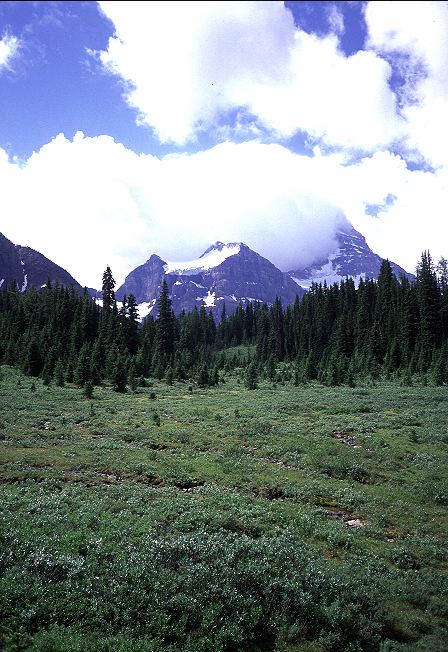
From the pass I dropped into a large valley separating me from Og Valley, where the GDT was located. The valley, with its green, wavy grass and pleasant mountains, except for the dagger of Assiniboine, engended kind, slow feelings. The sort of place where one should linger. A valley of this sort just seems to beg you to walk down it, to explore its recesses and learn what it holds. It isn't like mountain walking, where you have to work physically and worry about objective dangers. No, a valley like this is Edenic, peaceful. The mosquitoes, however, urged me one up the hill toward the Og.
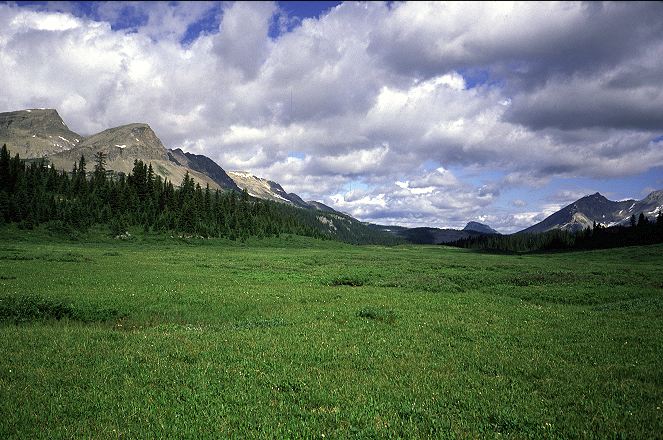
No pass separated the valleys, but rather a low hump-like ridge with trees, and a sign pointing the way to Assiniboine Lodge. No roads go to the lodge, which means that tourists generally stay away. The British Columbians allow helicopter flights into the park, which means that wealthy tourists can come in without effort, but those with fewer resources must put on a pack and walk in. It seemed about right, except for the helicopter part. Several had flown overhead over the last day, but not so many as to be intrusive. I declined to have a look at the lodge and instead turned to head down the Og Valley. After a few hundred meters of forest walking, the trail dipped and dropped out of the trees and down to the valley floor, which ran on and on for what seemed an eternity. Like the Spray valley, I could not see the end of it, which cheered me greatly.
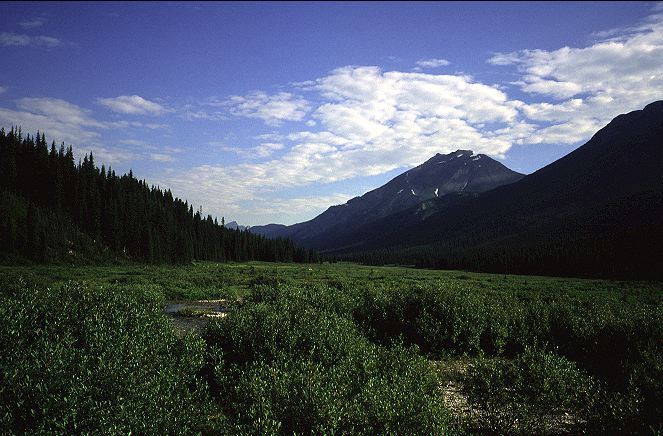
Occasionally Og Creek would surface, but mostly it seemed to run underground, despite the many braids and channels. Perhaps it was a pure snow melt creek. Strolling peacefully, with no signs of other hikers, the area was quickly becoming one of my favorites. Not just of the trip, but during my short life span. The combination of easy valley walking with big mountains and glaciers rimming it provided just enough excitement to balance the contentment of the valley.
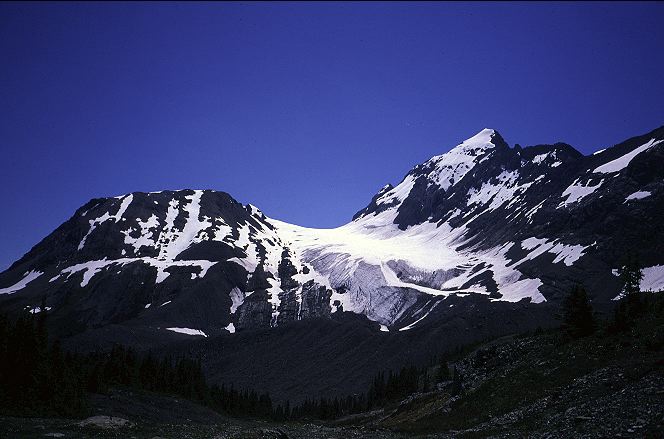
Distant mountains through obscure, forested side valleys were all around and the area seemed purpose built for wandering. Given a massive pack of food, a few books, and a few bottles of rum, I could be quite content in this valley for a week or two. I could hike up a side valley and set up an illegal basecamp and be assured of solitude. Spending my days in idle luxury in this place was an appealing idea. I glanced over my shoulder occasionally to see if Assiniboine was out, but always found it clouded, though getting better. There were probably lakes about where I could fish, also illegally, and plenty of firewood for roasting them, although fires were also illegal. It would, however, have to wait for some other summer. If Assiniboine was this good, what other wonders were there for me further north?
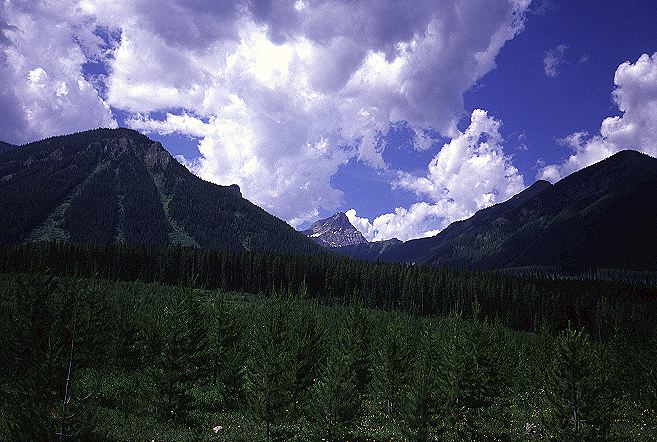
As I neared Og Lake, the dumping ground for Og Creek, it occured to me that the land seemed to be drying up. Vegetation was growing less and less green and more and more pale. The creek had almost completely disappeared and, as I rounded a hump of rock, when I spotted Og Lake, my suspicions were confirmed. The water level of the lake was clearly and unmistakably low. Low by several meters. Standing near it I spotted two hikers sitting around a sign, no doubt the sign were you had to pay $5 to put up a tent near Og Lake. They were still sitting about when I arrived and I introduced myself in a friendlier than usual way, the valley effect, no doubt. They were a father-daughter group and had come from the normal trailhead up and over Wonder Pass and down to the campground near Assiniboine Lodge, heading in my direction for Sunshine Meadows. Very tired, it seemed. The father, although his gear looked well used, was wearing plastic mountaineering boots. The daughter had blisters, but seemed to be in a good mood and there were smiles all around as we recounted where we had been over the last few days. Despite my growing dislike of Parks Canada, they did hold the keys to some truly special land. The two set off after a few minutes and I hiked down to the lake to rest and try to dry out my gear. Some sun had broken through the clouds, which I needed to rid my sleeping bag of condensation and my tarp, ground cloth, and food bags of rainwater. I needed the break, anyways: I wanted to see Assiniboine, and the weather was slowly, but surely, clearing. I wasn't going terribly much further today, just up the next pass and to the start of Sunshine Meadows, a place that the guidebook described in glowing, if populated, terms.
I lounged and lounged and got most of my gear dry, but missed Assiniboine, mostly: The top of the peak finally cleared, but as I reached for my camera, it clouded over again and did not come back. Another reason to come back to the area. I took off and moved down the valley to where it really began to tighten and drop, passing through an area called the Valley of Rocks. While there were rocks there, I didn't see much reason to name it so. I suppose it could have been unique in the area, but it was light any tight valley in the desert southwest of the US. I reached a trail junction leading to Porcupine campground in more time than it should have taken, and found the father-daughter combo sitting by the trailsign having lunch. Blisters were chewing them up and fatigue seemed to be eroding their enthusiasm for hiking. Originally they had planned to go to Howard Douglas Lake, where I was heading, but were considering the much closer Porcupine camp. I rested for forty minutes with them before the increasingly black skies, which I had not noticed, finally roused me from my lethargy. It was good to talk with them and I was enjoying their company. But, I wanted to get over the upcoming Citadel pass before the rain, and lightning, came down on me from the heavens above.
Moving hard along the trail, I became frustrated quickly. It was only supposed to be 2.4 K to the next trail junction and the start of the climb up to the pass. An easy 25 or 30 minutes. However, the time came and went and I still found myself on the flanks of a mountain, heading for a deep gash in the earth. If the weather was not so threatening, or if I was heading downhill instead of up, it would not have been of much concern. As it was, I was cursing the trail when I finally reached the trail junction after 50 minutes of fast hiking. The storm was now on the other side of the valley from me, and I could see that it was headed my way. Thunder rolled and lightning flashed, and I pondered, briefly, the wisdom of heading up to a pass. The storm was sure to catch me.

I started up the main climb to the pass and, not ten minutes later, the storm had crossed the valley and light rain began to fall. I put on my blaze orange pack cover to keep my kit dry, but declined to put on my rain jacket, despite the falling temperatures. I was going to be working hard soon, and the rain jacket might keep my dry from the rain, but would soak me from my own sweat. Powering up the switchbacking trail, I for once wished for a direct route. Something that would get up and get up fast. Instead, I had it easy. The rain began to come down full force, with high winds and thunder and lightning. I kept tabs on the lightning and thunder and vowed that if the lightning got within a mile, I would halt and look for a place of relative safety. I was completely soaked within a few minutes and only the hard pace I set kept my body warm. I put my hands together, little fingers on little fingers, thumbs on thumbs, in a sort of prayer gesture that I had adopted this summer in lieu of putting my hands on my hips while climbing. It seemed more Zen like. One, two, three hikers came down from the pass, in full GoreTex, looking like ads from the North Face. I was in a T-shirt, bandana, and black stretch pants and looked, I suspect, somewhat ridiculous in their eyes. Then again, they might have known something about hiking and realized why I wasn't covered up. I didn't stop and only floated words of greeting upon passing, wanting to keep up my body heat. Higher and higher I climbed, with water pumping out of my shoes at each step, and rain streaming down my sun-bleached beard. The trail began to relent, and I found myself now contouring along the flanks of yet another mountain heading for a flat area that seemed to be the pass. Delighted, I skirted a tarn in the midst of the rain and stopped under some trees to fetch my rain jacket. Now that I was no longer heading uphill, body warmth became important.
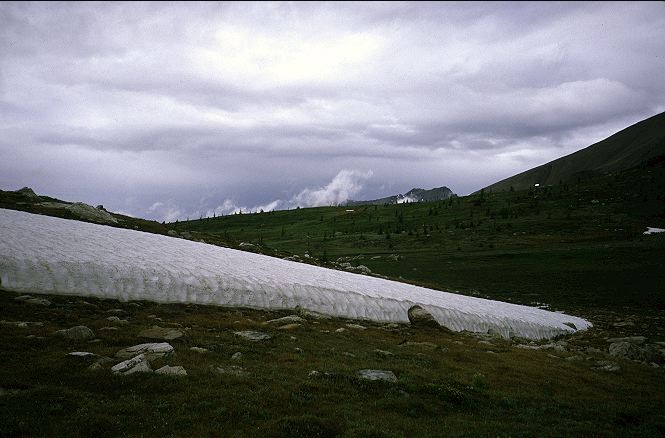
Leaving the small grove, I came upon Citadel pass, which seemed large enough to hold several Walmarts. I thought this place beautiful enough to tempt Abbey from his haunts in Arizona and Utah. A lone tent sat, illegally, in the middle of the pass. I certainly didn't care that it was there and mostly hoped that wardens were not in the area and would not kick the tenters out from this grand pass. I ran the valley, squishing my way along the un-drained trail (water bars being too difficult, it seems, for Parks Canada to build with all the permit fees they collect). The rain ceased but the cold wind continued to blow and blow. I cinched the drawcords of my jacket tight and drew the hood close, trying to keep as much warmth in myself as possible, at least until my body fought off the initial chill that came from my soaking. I was on the borderline between comfort and discomfort, and didn't want to cross over in this place. This place of seemingly unending beauty that was far enough from a trailhead that tourists couldn't get here. This place of green, white, grey, black, blue, tan, brown, and red. The multicolored mountains, some capped with snow or holding tight to a glacier, loomed around beckoning. Small tarns dotted the landscape, some no larger than puddles, others big enough to support a few microfish.
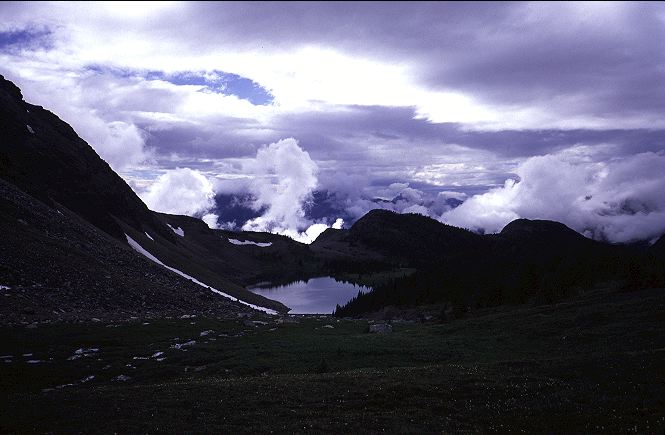
I liked the pass. Yes, I did indeed. Today was quickly becoming my favorite of the entire trip and, except for the rain, I was hard pressed to think of another day, ever, that held so much beauty, where the hiking was so easy, and where there were so few people. I had met seven people so far today over the course of nearly 36 K of hiking. Not a bad ratio considering the vast rewards that this place held. The sun became to come out and the clouds formed in odd, surreal patterns and wisps around the mountains. I wanted to paint, to draw, to record the place. I knew, in my heart, that it would do no good. I could not possibly record the green of the grass after the afternoon thunderstorm, or the exact way that the colors of the rainbow transitioned into each other. I could not grasp the clouds because they were not static, they did not remain in one position or one form. Most importantly, I could not accurately record the feelings and thoughts within myself that lent such Color to this land. I was in love, and there was no way to express this than with the crude instruments of paper, paint, or pencil. It would simply have to live on within me. I could not accept the First Noble Truth of Buddhism. I could not accept that all life is suffering. I could not in the face of overwhelming evidence to the contrary.

After a brief rest under the protection of a large sign welcoming me back into Banff, and listing all the restrictions upon what I could or could not do, I tramped up and down the rolling hills and eventually dropped down to Howard Douglas Lake. where a campsite was located. The lake or, more properly, pond, was not the most scenic in the world, but at least there was ample room for camping (no one else around) and the sites were reasonably flat and not depressed. The cold air did nothing to keep the mosquitoes away and within seconds of my stopping for the night they swarmed me. DEET helped quite a bit and I was able to get my tarp pitched and dinner started in good order, although I had to be careful to breathe through my nose, lest I swallow a little extra protein. The fuel tabs took almost forty minutes to cook my double helping of a salt flavored Uncle Ben's rice dish. I didn't mind the drab fare, I just needed the calories. If I had wanted to eat well this summer, I would have gone to Sri Lanka. The cold air temperature, combined with my wet clothes and skin and the mosquitoes, drove me under my tarp as soon as I was finished with dinner and had my food hung. I burrowed into my sleeping bag and put my wet clothes between my groundcloth and sleeping pad. They wouldn't dry by the morning, and this way they would at least be warm. I brought out HH The Dalai Lama once again and dove into the mysteries of the Four Noble Truths and Cause and Effect.
Just as I was preparing to shut my eyes, I heard sounds. Sounds that were not coming from a deer or rodent or bear or the wind in the trees. Hiker sounds. They came closer and I heard a shout of joy coming from female lungs. Had to be the father and daughter. They had pushed through a difficult day and had finally arrived at the campsite, nearly three hours after I had. I declined to get out of my warm bag, but shouted some words of encouragement to them from underneath my tarp. I was surprised to see them up here and it must have cost them a lot of desire to reach this place. I hoped that they had enjoyed the hike from Citadel Pass to here as much as I had, hoped that they were able to put aside their exhaustion and pains to see the beauty of this place. For once, I was glad to have company in camp.
It rained overnight and in the morning there were still clouds hanging about, threatening my morning contemplations. My gear was a bit damp from where rain had run down the mosquito netting and onto my groundcloth, but I was mostly dry and mostly in a good mood when I finally got going. The father and daughter were up unloaded some chocolate bars on me to lighten their load for the their last, brief, hike to Sunshine Meadows. We said our good byes and I started up the trail, climbing from the first, under increasingly dark skies. This was unusual, it seemed. The threat of rain began to pervade my thoughts. Not so much the getting wet factor, but rather because I was hiking on a treeless plateau, with only distant mountains to draw lightning. If it decided to pop, I might have a few difficulties.
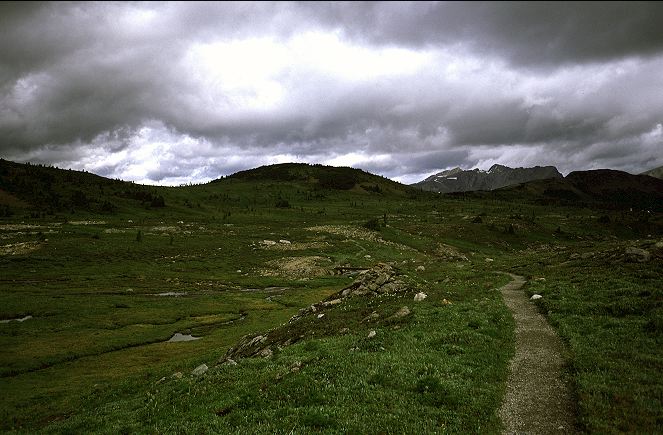
Pushing myself through such a beautiful area did little to improve my mood, and after only thirty minutes I was downright sour. I started spotting ski lifts in the distance and thought about how incongruous this was with the concept of a wilderness. Parks Canada wanted to limit hiker access in the name of solitude and wilderness preservation. Yet, they seemed perfectly happy to put the steel to the land in order to bring in skiers and more money. Hikers just didn't generate enough revenue, it seemed. I wondered if they limited the number of people who could use the ski resort in a day in the name of solitude. A few day hikers could be seen on the horizon, near the ski facilities, having been dropped off by a bus that came up a road (only for the bus) nearby. Some wilderness, especially in comparison to the area further south near Citadel Pass. I scowled at one elderly couple, rather than saying hello. I was growing more and more sour with each step. A pair of hikers seemed lost at a big trail junction, complete with signs. I nodded on my way past, not bothering to see if they were actually lost or not. The land wasn't enough to overcome my own failings, and I now I was pushing to get rid of the hotel-staying tourons who had taken a bus up a road to get to this magnificent place. I was, it seemed, something of an elitist. Or, rather, I wanted people to actually have to do the terrible thing to get here. To actually put one foot in front of the other and spend a little time to actually get somewhere, rather than having it dropped off in their lap. I wanted them to stay at home and look at a picture book rather than come to a place like this. I wasn't being rational and was indulging in those traits that I always felt were wrong in others. To make things worse, I didn't even feel better after having done so.

When I felt I was sufficiently far from the main staging ground for the day hikers (about 1500 meters away), I sat under a tree to rest a bit and to try to calm myself and all the negativity inside me. Everyone should experience some beauty in their lives, I thought, so why not the wealthy as well? Why should a stunning land only be accessible to those with time on their hands, who had centered their lives around something other than money. I could afford to spend the time to get here on foot, but few people had that luxury. Or, rather, they had traded their time for a larger paycheck. In order to make up for this, they needed quick and easy access to the best stuff that the park had to offer and there was no reason for me to despise them or to be rude because of it. I looked at the tarn below me and the mountains in the distance and felt better, but still something nagged at me. Something that would not go away and would not be soothed by placid words. I realized that it was not the people that I disliked. It was the fact that there was a road running right up to this place and that the machinery for ski runs had been bolted onto the land. Get rid of the road and the bus, and I would not have cared that the people were around. Then again, if the road was gone, most of the people would not have been here.
Not satisfied, but no longer completely gloomy, I set out for Simpson and Healy Passes. Simpson pass was very low and I actually had to descend to it before beginning the climb up to Healy pass. I cruised past a clot of Japanese dayhikers, saying hello as I went by, and then passed yet another group of hikers. Another group of hikers were met as the trees were giving out, and then a group of backpackers. Didn't anyone go anywhere on their own anymore? I saw two groups of backpackers struggling up the, to me, easy trail and a third sitting, resting on the way up. A group was coming down from the pass. There were people everywhere and I was sour once again. Get rid of the road and solitude will come without effort. How many of these people might be here if they had to walk another 10 or 20 K, uphill, on top of their hike? How many people were dayhiking because Banff wouldn't issue them a backcountry permit? The solution to the problem of overcrowding seemed so obvious. Get rid of the quota system and get rid of the road. Eliminate the requirement of staying only in official campsites to disperse overnighters. Or, build more, many more, backcountry campsites. Great Smoky Mountains National Park is the most visited national park in the US, seeing more than 10 million visitors per year. Yet most of the backcountry is deserted. Lots of small campsites and miles and miles of trail keep people spread out. With the exception of a few choice spots and lean-tos, every campsite is First Come - First Served. It was rare for me to camp with anyone in that particular park, and the campsites themselves were nicer than anything I had found in Canada's flagship park.
Shaking my head in disgust, I picked up a large plastic tarp that had come off of someone's pack, most likely their version of a pack cover. I tramped along, passing two of the groups of backpackers coming down (herds of eight) and found the third group (herd of six) resting. I asked if the plastic belonged to any of them and one young woman, looking sheeping, raised her hand. She didn't need to look at her pack to know that it was missing. She already knew and was just too tired to go back and pick up her missing pack cover. I handed it off and left, hoping that the pass would be empty of people.
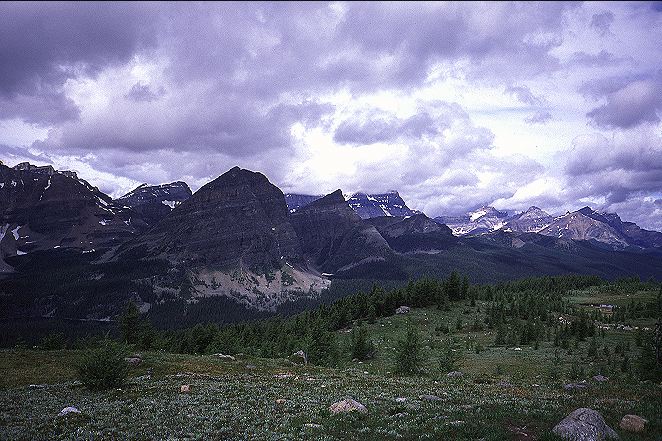
I reached the top barely sweating and mostly alone. No one was on the pass proper, but about two dozen people were huddled fifty meters off to the side of it where a small cliff provided some protection from the wind. The pass was beautiful, but I did not stop. The sight of swath after swath of bright, multicolored GoreTex seemed to spoil the beauty of the place. I would have had the same reaction had I found a neon McDonalds sign in the Grand Canyon. I tromped on and began the descent to the Egypt Lakes, where I was sure I would find more hordes. But, as I dropped down on the treeless slopes, heading for the forest, I noticed that there were no more hikers or backpackers. The place was emptying out. Although Egypt Lake was a world famous location (or, at least, so I had been told), it seemed that Healy Pass was enough for most people. If they went to Egypt lake, they might have to get an early start, or they might have to hike past Happy Hour back in Banff townsite. With the loss of the people, the land took on a brighter, more colorful light. I began to noticed flowers again and the glaciers on the mountains around me. The dark sky no longer seemed so dark, and I thought I even detected a trace of brightness to it that had not been there before. Within ten minutes of leaving the pass, I was in the best mood I had been in all day.
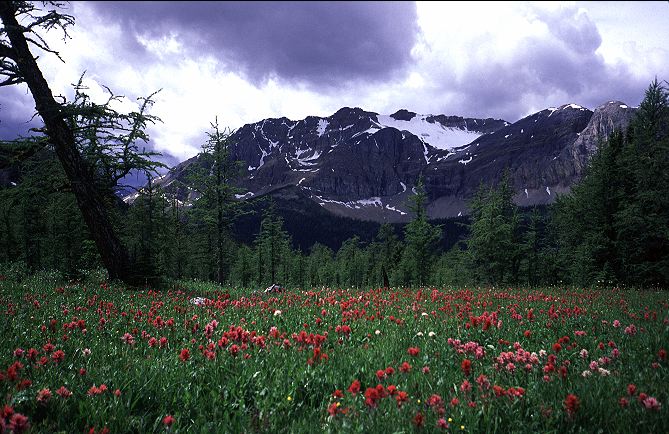
Originally I had planned to hike from Egypt Lake up and over Whistling Pass, which promised to be grand, and down to Ball Pass campground, where I might spend the night, or continue further north to Shadow Lake camp. The GDT ran in the other direction, over Ball Pass, but the other side of the pass, the Hawk Creek Trail, was closed, thus shutting me off from the Rockwall trail. I had to go around, thus my detour to Shadow Lake. My plans were spoilt by the weather, as I did not want to climb high into the alpine with the clouds and their potential lightning.
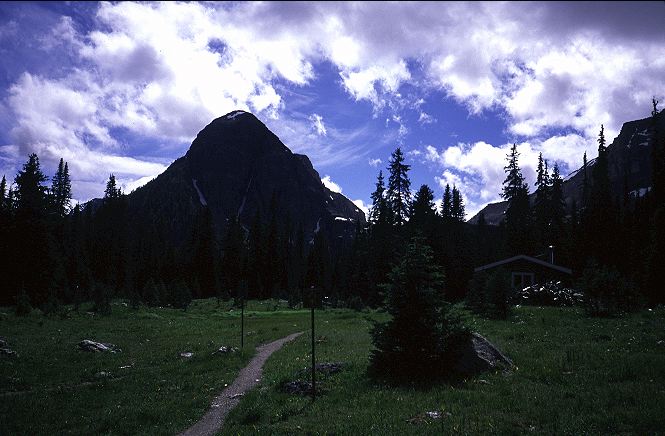
I found myself at Egypt Lake with a few blue patches in the sky and quickly spread out my damp gear near the woodpile next to the shelter. No one was about, although there seemed to be at least three people who were staying inside tonight. The shelter was really a cabin, complete with wood stove and supply, bunks (no pads) and other pleasantries. Even the toilets were fancy: Raised several meters off the ground (as opposed to the few feet of normal composting toilets) and sporting air fresheners. I lounged about, turning my gear over every ten minutes or so to get it to dry evenly. Chipmunks ran here and their, hoping I might drop some food for them to eat. And still, no one appeared. Given the crowds in Sunshine meadows and on the way up to the pass, I really expected to see more people here. And still, I was alone. I loved it.
I stayed at Egypt Lake for an hour eating Nutella and peanut butter burritos, with nothing in particular to do. It would take me less than two hours to reach Shadow Lake from here on the big, well built trails of this part of Banff. When the clouds came back, I gathered up my gear and moved to inside the shelter to wait out the gentle rain, which passed after thirty minutes. I set out down the Pharaoh Creek trail, which wound nicely around the flanks of the mountains that hemmed in the creek, occasionally switching banks via bridges. I rumbled past a campsite where a lone tent was sitting, its owner nowhere to be seen. More rain came and I donned by rainjacket and put my pack cover on and continued to trot down the trail. Three sweating teenagers came up the trail, heading for Egypt Lake, and for the first time since leaving camp, I actually smiled at other human beings.
I passed a warden cabin (empty, of course) and took a left,h heading up hill toward Shadow Lake and my home for the night. The rain tapered off and a gentle mist settled into the trees, giving everything a spooky look. The cold came as well, but the uphill hiking kept me warm. I arrived shortly at the campground and found only one group of three tents clustered in one of the campgrounds. Fortunately, they had not take the best site that I had yet found in the national parks. Well drained, slightly elevated, next to a comfortable tree, and soft with pine needles. I couldn't believe my luck and double checked that Parks Canada gave permission (at least, if I had had a permit) to stay here. I quickly set up my tarp and scurried over to cook my dinner of ramen noodles; the fuel tabs made cooking take three times as long.
The inhabitants of the three tents came over to join me in the cooking area and we all had a good laugh at my fuel tabs. They were robotics engineers from some government research facility. All had PhDs. When I told them about my own background, we all laughed some more at the collective intellectual power concentrated in this little campsite in the middle of a big park. I had covered, today, the ground that took them three days. They thought this very funny, and we again had a big laugh. Everything seemed to amuse them, and I really liked that. They didn't take my hiking style to be a threat or comment on theirs. Instead, it was simply funny. They told me that they had met a group of GDT hikers only a few days before at Marvel Lake. I was getting closer to tracking down my first set of long distance hikers, although there was a distinct possibility that our paths would not cross if the others forced the Hawk Creek trail. We spent ninety minutes talking and laughing, particularly at their unofficial tests of their robots in the parking lot, near the boss' car, but rain returned and we all scampered for our respective shelters. I had hiked through beautiful land, but could not get over my animosity toward the others I found. But, once I got over Healy Pass and down to the campsite, I was completely healed. I was amazed by the transition of my mood during the day and hoped some of the good nature that the evening's laughter had engendered would say with me in the future. The rain and HH The Dalai Lama lulled me to sleep, as peaceful a sleep as I had ever had.
Rain fell again last night, but by the morning it had ceased and things looked promising for the day. Around two in the morning I had been awoken by very loud snoring, which was rather surprising as the engineers were a good thirty meters away from me. A partially blue sky and cold temperatures greeted me when I finally coaxed myself out of my sleeping bag and walked over to the food hang area to retrieve my breakfast. Still no tea for me, as the fuel tabs would make that an hour proposition. In the trees, about fifteen meters away from my tarp, there was a new tent. Someone had come in very quietly during the night, and it must have been the occupant whose snoring woke me up. The engineers were up and we had a quiet laugh about the snoring, and our mutual suspicions of each other. By 7:45 I was thumping up a 450 M elevation gain to Gibbon pass. The cool air and relatively gentle grade made the climb to the broad alpine pass an easy one. I was really getting to like these Canadian passes. Rather than the sharp, abrupt passes of the American West, where you power up to a small notch and them come straight down, Gibbon pass, like Citadel Pass, was almost plateau like, a long flat area in between the mountains with lots of flowers and open space.
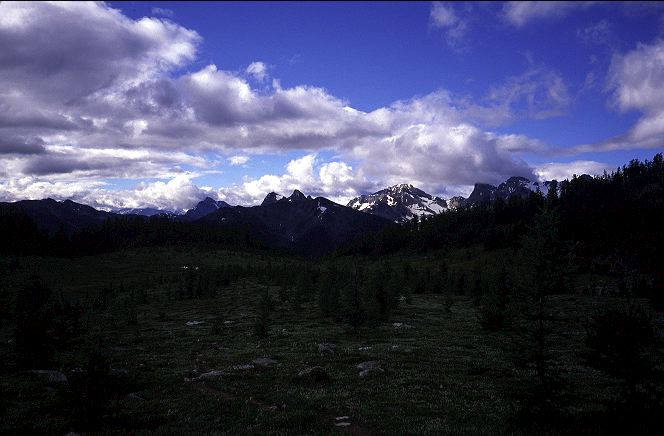
The skies had cleared considerably and the sun was out which made for a nice change from the last two days. The pass area ended and I began to descend steeply through the woods, with occasionally views down to Twin Lake below me and a tall waterfall that cascaded down the mountain side, feeding the lake. Upon arrival at the Twin Lake campground I was met by six preteen girls and an unknown adult woman, who insisted on shouting from across the lake to the girls. She apparently wanted them to hurry up and get their stuff together. I was glad that I was no longer a child and under another's control. To be more precise, I was glad that I was in control of my own life. I sat on a rock to rest, the girls coming and going between the eating and tenting areas, and the adult throwing shouts and threats every few minutes. I pushed on out of the trees and crossed the outflow of one of the lakes, which seemed to come from the very base of a towering mountain.
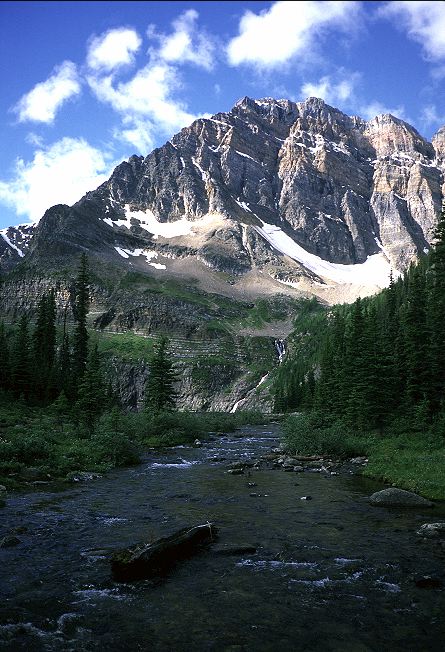
Up and over a small hump, and then the long descent down toward HWY 1, the TransCanada. I could see it carving through the land, snake like, doing its best to run the valleys through the Rocky mountains, although it was too far off for me to hear it. Small lakes dotted the land and the tranquility of my morning was broken only by spotting the occasional RV or trailer moving down the highway.
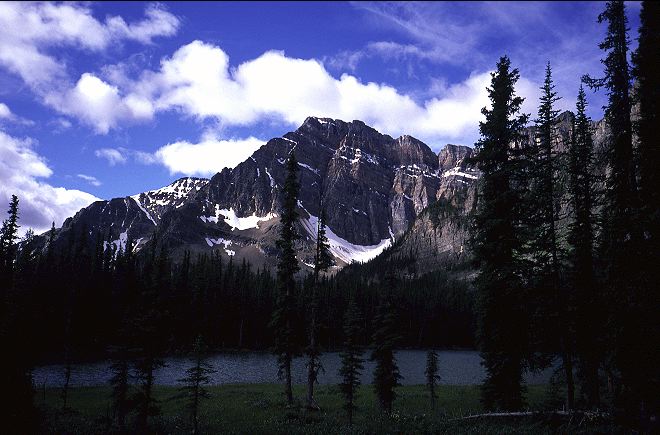
I thought about the Four Noble Truths once again, now that I was alone and had the space to think. There seems to be something about the presence of other minds that keeps me from delving with any depth into a subject. If I could not accept the first Noble Truth, that life is suffering, then what about the second? Is the cause of suffering desire? Desire for social acceptance and traditional values led many people to work jobs they really didn't like, in order to buy things they really didn't need, or to appease other people. Or, for that matter, to take care of other people. Once you had children, your life was no longer your own and some people were, certainly, working for the simple reason that they had to support a family, or an older parent, or a disabled spouse, or, well, whomever. Desire for numbness and escape from the past drove many people to suffer the ills of alcoholism or drug addiction. Desire for long life led people to flee from freedom and liberty and into the hands of Security. While not, by any means, a new phenomenon, this trading of personal freedom for personal security (or, rather, the illusion of it) seems to have increased in recent years after the attacks of September 11, 2001. People suffered both mentally and physically because they could not live up to a certain idealized body type and their desire to do so brought on the afflictions of disorders like anorexia, or a constant self loathing. Desire for material success made people discard ethical values in the pursuit of profit, bringing suffering (an evil life lived is always suffering) not only to themselves, but also to those under their control. People were fighting and dying in parts of the world, while certain organizations were reaping massive profits. The Second Noble Truth seemed fairly self evident, although not as clear as one might think. The suffering brought to an individual seemed to be caused by by their own desires and by the desires of others. Additionally, in order to make seemingly uncaused suffering fit, one must include the notion of reincarnation, where one might suffer for past actions and thoughts. Of course, I could be making things more complex than they need be. If all life is suffering (the First Noble Truth), then the desire for life (clinging to the Self) must be the cause.
I found myself at the TransCanada and the trailhead. Several cars were in the parking lot and an elderly couple walked by me, asking only if I was from Minnesota. An odd question, to which I simply shook my head. Disappointed, they began hiking down the trail that I had come up. I now had to walk along the central artery of Canada, for a good 12 K, in order to reach the trail up to Helmet Falls, which marked the end of the Rockwall Trail. I was missing some of the greatest land in the Rockies, according to every source I had encountered, but their was nothing to be done about it: If I wanted to hike the Rockwall, I'd have to roadwalk the 12 K, plus another 30 or so to reach the trailhead near Hawk Creek. Fortunately for me, the TransCanada had a very large shoulder for me to walk on, with ample grassy areas to lounge in. Even better, it sloped downhill all the way. Traffic had intensified now that the afternoon had arrived. It seemed that every third vehicle was some sort of giant RV. Additionally, every third vehicle was also a large pick up truck pulling a massive trailer. The rest of the vehicles seemed to be either commerical trucks or buses, or ordinary passenger cars. The RVs and trailers were approximately three times the size of my first apartment in Bloomington, and it baffled me why people would want to bring so much stuff on vacation. The gross display of materialism was somewhat sickening. Only half the plates were from the States, so it seemed the RV lifestyle was not isolated in Ugly America.
A bighorn sheep stood still by the side of the road, being photographed by a few cars parked on the shoulder, which forced me to cross the highway. I couldn't see why the sheep was generating such interest. It was as tame as a house cat, and one wouldn't block up traffic on a highway just to photograph a cat. The allure of wildlife lay, for me, in the fact that it was Wild: A bear in a zoo is about as special as a dog in a yard. Anything special about it was killed when it was caged. It would be better to put it out of its misery than keep it in a cage. I considered throwing a rock at the sheep to drive it off, but decided that such an action might bring down the ire of the tourists, who no doubt were thrilled to see such a creature. I had no right to force my own values upon them.
I reached the Marble Canyon campground in Kootenay National Park,where I had planned to pick up a trail leading to the Helmet Falls Trailhead. Burned, closed, done. I began to worry about the Helmet Falls trail. If it was burned out, I was in trouble. There was no other way through the mountains between me and Field, other than HWY 93, another larger highway than split off from the TransCanada. There were trails running near it, but to get there I would have to retrace my steps, and then road walk even more. As always when I become anxious, my pace quickened. I came around a bend in the highway and spotted cars turning into a parking lot another kilometer ahead. Reassured that the trail was open, I slowed back down and began to stroll once again.
The trailhead for Helmet Falls was located in a front country area called the Paint Pots. Vermillion, a natural mineral or compound or whatever, was used to dye clothing and as a paint, both for face and object, by the First Nations in the area. The Paint Pots were a large deposit of it and Parks Canada had built up a sequence of trails for walking around the area (of course, you couldn't walk out onto the vermillion deposits). The parking lot was filled with cars and RVs, although the number of people I encountered on the Paint Pots trail seemed much smaller than the number of vehicles in the lot. In less than a kilometer I left them behind and began the climb up toward Helmet Falls, one of the highest waterfalls in the Canadian Rockies. I assumed that the rest of the vehicle riders were somewhere above me, visiting the falls. The skies opened, then closed, and rain began to fall around 4 pm as I was motoring up the trail. The rain was enough to wet me, but little else, and it was short lived. Still, I passed no hikers. The trail eventually moved into the valley holding the flow, I presume, of Helmet Falls. A pale blue color, with plenty of glacial milk, the creek was a delight to walk by. The sun came out to join me on my walk up the narrow valley. Large, towering mountains could be glimpsed through the trees, but mostly this was a forest walk. And a delightful one at that. I stopped several times by the creek, even though I was not tired. There is just something about sitting under a sweet smelling tree, with the sun out, and a creek at your feet, that is so pleasant, so natural.
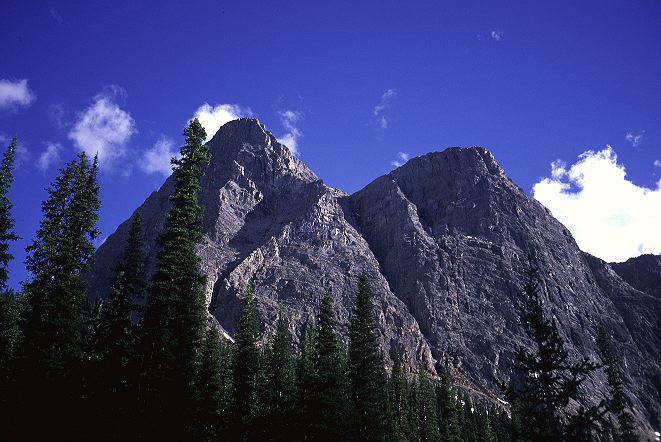
Nearing 6:30 I finally reached a bridge across the creek and rolled past the warden cabin (empty) and into the campground. Two others were here, in this massive campground. There was probably space for two dozen tents, and the sites were even fairly good. I picked out a reasonable one and set up my tarp, hoping it would dry some before the evening condensation came. I spread out my sleeping bag and ground cloth, hoping they would dry a bit in the remaining sun, but with the high mountains around me (the campround was in a cirque), I knew that the sun would not last long. I found the cooking area and started three fuel tabs going to make my generic ramen, my lovely dinner of imitation chicken and salt flavored noodles. With the tabs going, I had a good twenty minutes to kill and so walked out to the falls.
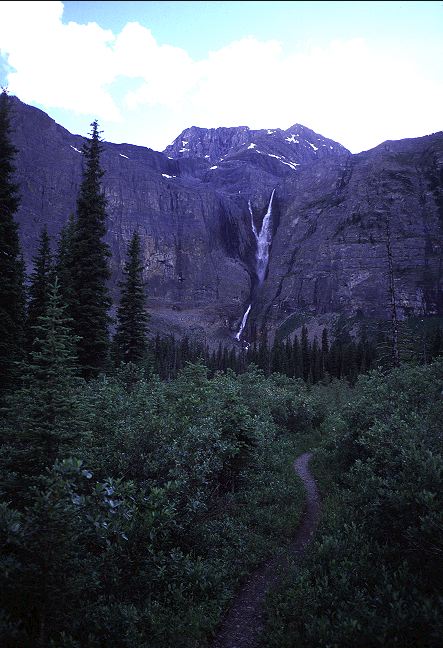
While they were certainly tall, they had little character to them: Just a lot of water falling from a great height. The much smaller Eagle Creek Falls, on the PCT, were certainly more wonderful. I returned to my dinner and took the lesson to heart: The hike up the creek to the Falls was far better than the actual destination; that is, the falls. After eating dinner and snacking on some Nutella, I retired to my tarp and sleeping bag and HH The Dalai Lama. I had still not figured out what things are impermanent and what are not, if any. The law of Cause and Effect was crucial to the Third Noble Truth, which concerns the cessation of suffering by ending its cause. In order for this to work, events, objects, things, must have no existence independent of their causes. Otherwise, cutting off the cause of an event would have no effect upon it. I was hoping HH The Dalai Lama might explain this to me in more detail, but it seemed not to be, at least for tonight. I closed the book and thought of tomorrow. I was getting used to going to sleep at 9:30 pm, with it still being completely light outside. I missed the sunsets that I so enjoyed on the PCT, but at least I could sleep normally now. Tomorrow I would reach Field, BC, two days earlier than expected. Mark and Kristine, my friends from grad school days who now lived in Calgary, were coming out to meet me. Because of the incident at Line Creek mine and my route around Hawk Creek, I had cut several days off of my hike. I had slowed down as much as I could in order to not arrive too early. Still, I would have plenty of time to kill in Field before they arrived. I hoped Field might be like Blairemore or Elkford, but did not expect it to be. All the tourists had to stay somewhere, and Field was close enough to big attractions. Where would I stay tomorrow? The closest campground to Field was 5K up the highway and I didn't really want to pay $19 for another rock hard piece of ground. I loved the uncertainty. Huck Finn was taking over again. There was no reason to worry about it. Problems generally solve themselves, if you let them.
For the first time in a few days I awoke to find a streak of sunshine on my tarp in the morning. The usual cold air greeted me and, as usual, I declined to make tea with the awful fuel tablets. The two other campers had not yet stirred, even the one that had slept out in the open, only a few meters from where I was (quietly) packing up. I was hiking up hill toward Goodsir Pass by 8:10, thrilled to be where I was and looking forward to the evening. The trail was mostly forested during the 450 meter vertical climb, but near the top I broke out into the alpine and began the final climb to the pass. Like Citadel and Gibbon, Goodsir was long and broad and plateau-like. Filled with flowers and rimmed with mountains, it was a lovely place. I was staring at my feet, though, for the last, few tiring meters. I happened to look up and saw a thing. About five meters from me sat a grizzly bear. Quite literally, a grizzly bear sitting on its rear, directly on the trail, staring at me. I was glad that I had looked up. The bear had a slightly curious look on his (or her, I could not tell) face and seemed very calm. No sign of aggression or agitation. Just curiosity. I didn't feel the need to draw my bear spray or do anything, other than look in the bear's general direction. It seemed the bear had known (by scent, most likely), that something odd (I hadn't showered since Elkford, and that involved no soap) was coming up from the other side of the pass and had simply wanted to find out what it was. My heart rate didn't increase, I didn't start sweating. One (permanent) inhabitant of the forest was simply meeting another (temporary) inhabitant. There was no fear, no trepidation. Satisfied, the bear slowly got up and trotted off into the woods. There was no primal feeling of fear within me, and no great relief when the bear had left. I had met one of the arch-symbols of the wilderness and felt privileged to have done so. Smiling, I continued along the pass as pleased as could be.
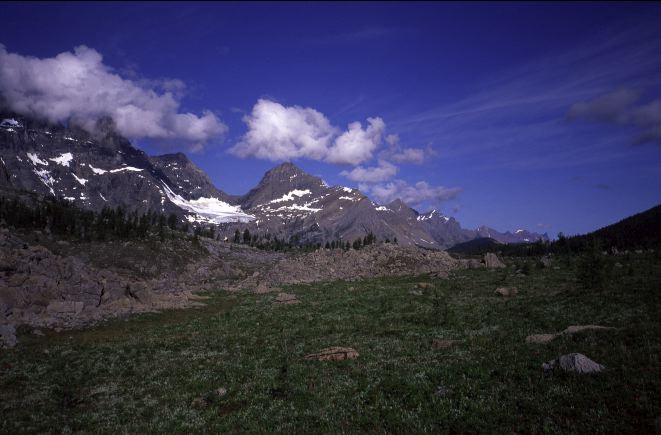
On the other side of Goodsir I began the long, switchbacked descent down toward MacArthur creek. I was at a highpoint, for now, both geographically and spiritually, and was sad to be coming down. The trail became overgrown and I was quickly soaked from the plants, which were still wet with condensation. A few trees were down, but they were nothing that a hiker could not pass (a horse, was a different matter) and I rolled into the MacArthur Creek warden cabin around 11:30, with mostly clear skies. The cabin was empty and held a great view of the mountains across the valley from it. I was in Yoho National Park now, although I had crossed no boundary marker. I decided to rest at the cabin and dry some gear, in no rush at all to get to Field, even though I had not been in an actual town since Elkford.
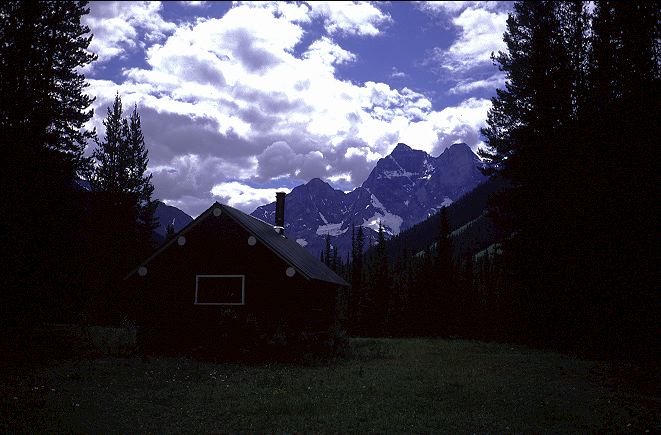
Somewhere in the area was a campground (I had a reservation in two nights time to stay here), but undoubtedly it would be off in the woods somewhere. The cabin had the great view and it seemed silly to camp elsewhere. I pondered staying here for the night and walking down to Field tomorrow. I had the food and the time, so why not? Only a sense of curiousity would drive me down the slope. Shortly after my arrival, two men wearing uniforms and came riding up the trail on mountain bikes. It seemed I was to meet my first warden, in the backcountry, in more than 500 K of hiking. It was not to be, however. Although they wore uniforms, John and Chad were trail crew members. That is, they helped clear and maintain trail in the backcountry, something warden's apparently didn't do. They had been paid to cycle up to MacArthur Creek, clear the trail for a few hours, and then coast on down. It seemed like a nice job to me. The sun was out completely, which helped dry my gear quickly. The three of us had lunch and talked about the area, the grizzly, and my trip. John had spent a lot of time in the area and had many recommendations for things to do with my extra time off. One side trip after another came up, until we had filled up my map completely with things to do. Given a week, I could have stitched them all together into a great loop, taking in the best of Yoho. Alas, I didn't have a week and knew that when I reached Field I would go into my lazy town mode. There was another route I could take toward Field, up a valley that was currently closed to hiking because of grizzly bears, and I wanted to know their opinion of it. Frequently some areas are closed to hikers because of animal activity, either aggressive or simply because the managers want the animals to have some space. But, a single hiker wouldn't make a difference. While feasible, and beautiful, they thought it best not to try the patience of Mr. Grizz by strolling through a closed area. It wasn't a good idea to tempt Providence and I agreed. I was confined to the old fire road that they had ridden up, which they assured me was easy and pretty hiking.
I told them what I knew of the trail conditions above the cabin and they set off for an afternoon of clearing. Before going, John suggested that I stop in at the trailcrew headquarters and ask if I could camp on their lawn. He thought that if I played things right, I would eventually be given permission as this is where most of the trail workers stayed overnight anyways. I lounged at the cabin a while longer and then set off down the fire road around 2 pm, after a very long break at the cabin. I passed a turn off (into thick woods) to the the campground and a few meters later met a creek, on whose banks I had to stop and take yet another break. I had walked a grand total of thirty meters in between breaks.
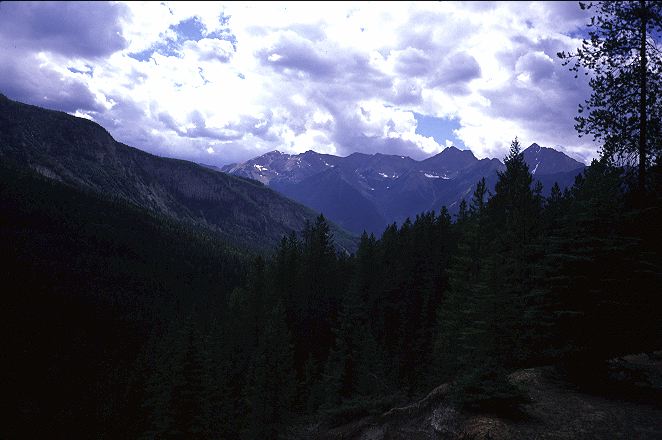
The fire road did give nice views occasionally and was quite easy to hike. Mostly down hill, occasionally in the sun, occasionally in the shade, it was the sort of pleasant walk that anyone could enjoy. Only, I seemed to be the only person enjoying it. Even in the soft parts of the road, where foot prints would normally be found, I could see nothing other than the mountain bike tracks from John and Chad. It seemed like a fairly natural hike, to come up Helmet Creek, over Goodsir Pass, and down the Ottertail. I wasn't complaining over the lack of people, but I was a little mystified why there weren't more people out. One didn't even have to go out for a full day: You could ride your mountain bike up to the cabin and back down in a morning or afternoon. So, the question again was: Given the easy of the land and how pretty it was, where were all the people? There were tons of RVs and trailers and people in the front country, but here, now, in the backcountry, there were none.
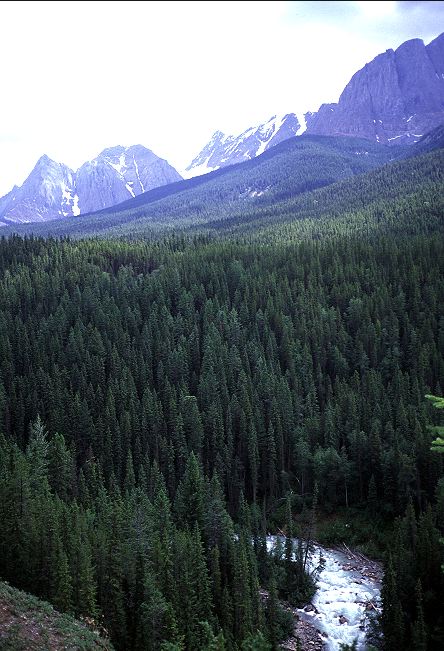
The fire road began to drop down toward the Ottertail river, which flowed in a heavily forested valley flanked by large, glacial mountains. Jagged, ice bound rock. I wondered if any of them were unclimbed still. No trails led to them, and climbers were notorious for being lazy over difficult approaches. I took many breaks on the way down, partly because I liked the views, but also because I really had nowhere to be. Once I reached the trail head (and HWY 1), I would have no more wilderness, no more forest in which to repose.

Slowly, but surely, the sounds of HWY 1 began to filter through the trees and warned me of the immediate end of the fireroad. I was actually sad to be approaching a town, the first time this had happened to me. Long distance hikers, myself included, usually love getting to town, as it allows them the luxuries that have significance only in comparison with life in the woods. The fire road flattened as I neared the road, the roar of diesel engines breaking the spell that had held me since I encountered the grizzly. I was back in civilization, even if I could not yet see it.
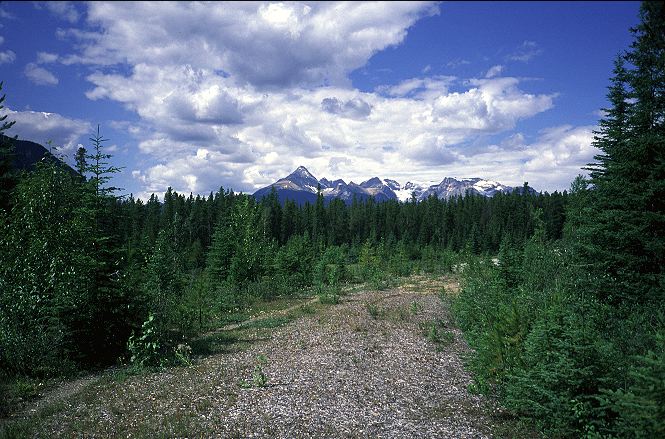
I reached the trail head, a few meters from the highway, and found some shade in which to cook dinner and rest a bit. I spread my socks (I had scrubbed them out earlier) out on the trail sign and reclined on the concrete surface of the lot, under the shade of a tree. Cars, trucks, buses, RVs, and motorcycles roared by at 110 kilometers per hour, heading somewhere. I started three fuel tabs going for my macaroni and cheese and dozed for a while. I awoke just before John came careening down the fire road on his mountain bike, a little surprised that I had made it as far as I had. I didn't mention how lazy I had been. He was in a rush to get back to the headquarters because he had to pick up his wife from work in a little bit. We said good bye and he pedaled away, the first employee of Parks Canada that had actually been friendly and helpful. The first time I had met a representative of that institution that had not left an annoying impression on me. I liked John. I finished dinner and was getting ready to set out when Chad came down the trail. His bike was partially disabled, which is why it took him so much more time to get down the fire road. He, too, was in a rush to get back to headquarters and meet his woman. We chatted briefly as I packed up my stuff. And then he, too, pedaled away. The second positive encounter with Parks Canada. I set off up HWY 93 heading for Field, but had to turn around after a kilometer to retrieve my socks that I had set to dry on the trail sign. With socks secured, I started up HWY 93 again and saw John, heading toward Golden and away from Field, in his truck. He blinked his lights and waved at me, accelerating hard, late, it seems, to get his wife.
HWY 1 was busy and sunny, with many vehicles but with a large shoulder and ample places to take a break. I passed the Parks Canada trail crew headquarters, but declined to go in and ask for a patch of ground to sleep on. I had thousands of acres in which to camp, illegally, and it seemed a poor decision to sleep inside a compound. I crossed the railroad tracks and came within sight of Field, sitting on the banks of the multi-channeled Kicking Horse river. I crossed a bridge and saw a place where I could scamper down to the river itself. No parking lots or places for cars meant that I would not have to worry about two legged predators, although I might have to contend with a hobo or two for a choice camp. I looked around the banks for a dry, level campsite and eventually selected one in a small grove, out of sight, but not sound, of HWY 1. I put my tarp up and walked over to one of the river channels to contemplate. I amused myself by chucking rocks into the river, trying to skip a few across to the bar on the other side. I could have made it in to Field in about thirty minutes and had a hot dinner and beer and possibly a motel room. Again, it seemed a poor option compared to my place by the Kicking Horse. Last summer I would have walked in, for sure. Now, I was at peace here by the water. The sun went behind the mountains, but it was still light out and I was determined to sit up and get a rare sunset on the GDT. Thoughts of Buddhism crept into my head, but just as quickly floated out. I was still and thinking about something specific, philosophizing about a topic, just didn't take. I simply sat.
The world began to glow orange and pink with the setting of the sun, but I wearied at my seat by the river. With the sun so far behind the mountains, I wouldn't get the sort of light that I loved and so retired to my tarp as the brief display of light came to and end and the purple hue of the night set in. The sounds from the highway began to die out as tourists settled in town. A train screeched by, but once gone the land was quiet once again and I began to settle into a dreamscape. Tomorrow was unknown beyond the fact of coffee and breakfast. A full day, then most of a day before Mark and Kristine would come to meet me. No further plans other than to try to fatten up. I loved it.


































